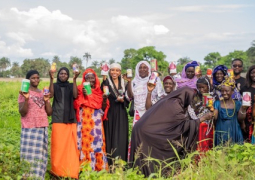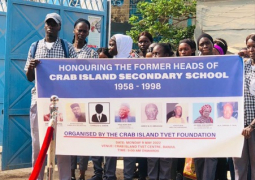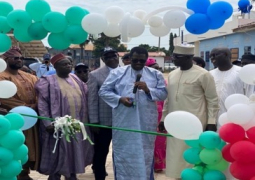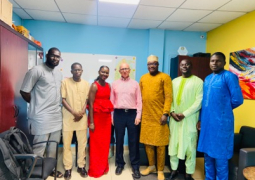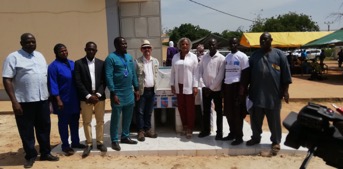
The facilities were constructed to the tune of USD 2 Million, with 5 stations each in Upper River, Central River and Lower River Regions; 2 in North Bank Region, 3 in North Bank East Region and 2 in the West Coast Region. The project also provides a backup solar-powered water system with a tank capacity of 10,000 litres to these facilities.
Welcoming the gathering, Abdoulie Jarju, regional health director North Bank East, revealed that the health directorate covers 174 communities that stretches from Kerewan to Palodi with a population of 121,369 with 24,273 under-five.
“The region has 7 public health facilities, 6 community clinics, 2 private clinics and 14 primary health care key villages. Furthermore, every month 52 RCH clinic is conducted of which 15 are base clinics and 37 out reaches.”
The region, he added, has one hospital that serves as a referral to all other health facilities within the region, saying in 2022 with support from UNICEF, the region was able to train 69 health care workers and 83 support staff on infection and prevention control.
Jarju thanked UNICEF and its partners for ensuring that health services in the region is brought closer to the populace through capacity building, community engagement such as promotion of key household practices.
For his part, Gordon Jonathan Lewis, UNICEF representative in The Gambia, acknowledged that women empowerment is fundamental and essential to guaranteeing safe home to not only the health of children but the overall health of communities and nation in particular.
He underscored the role of women in the health of any community, adding that women have demonstrated a leadership role in encouraging more people to get vaccinated as seen in the Covid-19 and now the measles-rubella mass vaccination.
UNICEF country rep thanked USAID for providing the funding to put in place 22 permanent hand washing stations with functional running water installed at 22 health facilities in high risk communities across the country.
“These facilities are constructed to the tune of USD 2 Million, with 5 stations in Upper River, 5 in Central River and 5 in the Lower River Regions; 2 in North Bank Region, 3 in North Bank East Region and 2 in the West Coast Region. The project also provides a backup solar-powered water system with a tank capacity of 10,000 litres to these facilities.”
Additionally, he stated that USAID has funded the procurement of 600 buckets with mop, 350 garbage bins and 2,170 buckets with taps.
He extended special gratitude to USAID through the US ambassador to the government and people of United States.
The facility, he added, would guarantee safe water and sanitation for the people of The Gambia, thereby contributing to the elimination of Covid-19 in the country.
The provision of the facilities backed by intense hand washing campaigns, he added, would help prevent infection and control of Covid-19.
UNICEF country rep reminded that Covi-19 is still around and called on all to play a part in making our community safer and better place for all.
Also speaking, Sharon L. Cromer, ambassador of the United States in the Gambia, thanked USAID for the support, acknowledging the hand washing facilities commissioned, would reach approximately 264,000 people representing 10% of the country’s population.
Ambassador Cromer acknowledged hand washing with soap is critical in eliminating the spread of virus, saying it greatly lowers the risk of transmission especially in high risk areas.
“Therefore, US government through USAID is honored to be a part of this effort to provide hand washing stations and also to assist in certain health facilities with un-interrupted water supply.”
She called on communities to adhere to the key message that hand washing saves life, noting that the start of the covid-19 pandemic has led a global fight against the pandemic.
“US government is today responded to in more than 120 countries with over nine billion dollars in funding towards the fight against the pandemic.”
Also speaking, Lamin Fadera, programme manager Water, Sanitation and Hygiene (WASH), deputising for the Minister of Health, said the day marks an important milestone in the long standing and genuine partnership between the Ministry of Health, UNICEF and USAID in their relentless partnership and support to the government of the Gambia.
“Barely a month ago, I presided over a similar gathering where USAID through UNICEF presented medical supplies to the Ministry of Health to equip us in our effort to fight against Covid-19. And today, we are here again here to inaugurate the opening of 22 hand washing platforms, which are constructed all over the country. The very presence of the eminent individuals assembled here this morning, clearly demonstrates the absolute importance of this event.”
The Gambia Government, he added, recognises safe water, improved sanitation and hygiene are essential in achieving the improvement of people’s health and development as well as in contributing to the attainment of the target under Sustainable Development Goal six.
“The SDG targets relating to sanitation are much more ambitious and through it, sanitation and hygiene are also considered as major determinants of poverty.”


